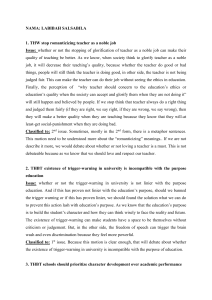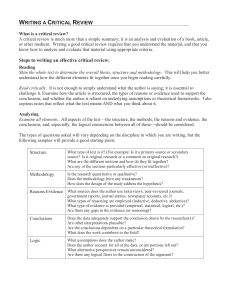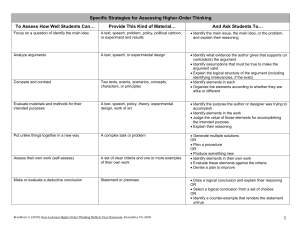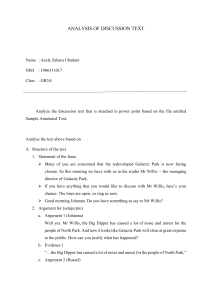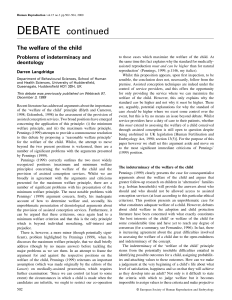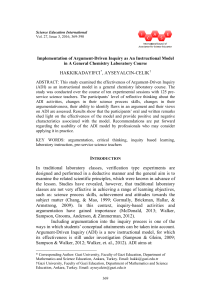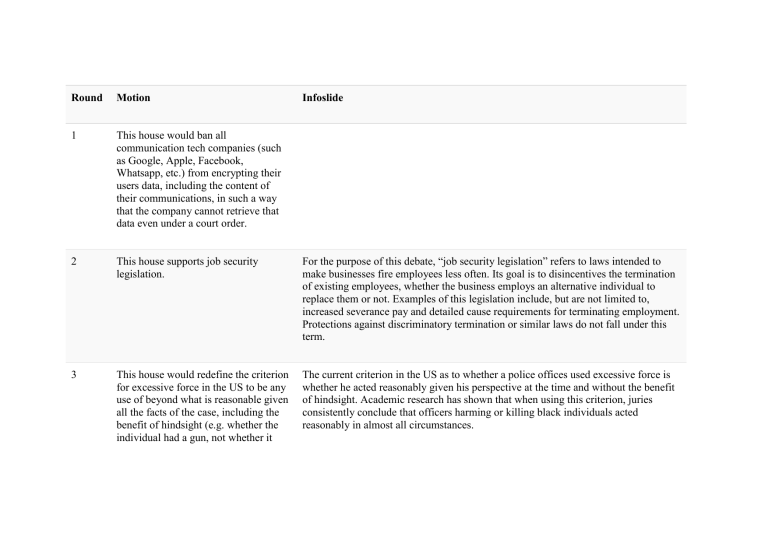
Round Motion Infoslide 1 This house would ban all communication tech companies (such as Google, Apple, Facebook, Whatsapp, etc.) from encrypting their users data, including the content of their communications, in such a way that the company cannot retrieve that data even under a court order. 2 This house supports job security legislation. For the purpose of this debate, “job security legislation” refers to laws intended to make businesses fire employees less often. Its goal is to disincentives the termination of existing employees, whether the business employs an alternative individual to replace them or not. Examples of this legislation include, but are not limited to, increased severance pay and detailed cause requirements for terminating employment. Protections against discriminatory termination or similar laws do not fall under this term. 3 This house would redefine the criterion for excessive force in the US to be any use of beyond what is reasonable given all the facts of the case, including the benefit of hindsight (e.g. whether the individual had a gun, not whether it The current criterion in the US as to whether a police offices used excessive force is whether he acted reasonably given his perspective at the time and without the benefit of hindsight. Academic research has shown that when using this criterion, juries consistently conclude that officers harming or killing black individuals acted reasonably in almost all circumstances. was reasonable to believe he had a gun). 4 This house would limit the amount of time that a museum can display a given piece of art to 3 months out of every 10 year period, rather than allow museums to display their works as long as they choose. 5 This house would allow citizens to vote on individual bills in place of their representative, with the representative retaining the voting power of those of their constituents who did not directly vote on that specific bill. 6 This house believes that all states should mandate that research on and use of CRISPR technology be exclusively carried out by institutions funded entirely by the state. 7 This house, as Iran, would cease all support for military groups in the The art that you see in a museum typically comes from one of the following sources: i) that museum’s permament collection that’s always on display, ii) that museum’s permament collection that is mostly kept in storage and may occasionally be displayed (the largest museums usually display as little as 5% of their collections); iii) pieces lent to that museum on a temporary basis by another museum iv) pieces donated or lent by private individuals or institutions. CRISPR is currently the only existing technology that allows cheap, fast and targeted gene edition in living organisms. It potentially allows for heritable* changes, though so far very little research on such heritable changes in humans has occurred. * heritable changes are changes that can be passed on from parents to their children. Middle East (e.g. Hezbollah, Hamas, Houthis, etc.). 8 This house prefers a world in which all individuals who have achieved a middle class standard of living choose to pursue the highest level of achievement in their chosen career, rather than a wold in which those individuals priorities day-to-day enjoyment over work. 9 This house would not allow out of court settlements for workplace discrimination and harrasment. EFL_S emis This house believes that Catholic religious officials in Mexico should not make statements in support of governmental policies, political parties, or candidates. EFL_Fi nal This house believes that it is better for the general population to be more optimistic about the current and future state of the nation (including societal cohesion, peace processes, the state of the economy) than an objectively accurate judgement. ESL_Q uarters This house, as the Chinese Communist Party, would lift all restrictions on foreign investments in China, except restrictions critical to national security. ESL_S emis This house prefers a non-adversarial legal system ESL_Fi nal In democratic post-colonial states, This house believes that opposition parties to the party of independence should claim and use the legacy of anticolonial resistance. Open_ Partial_ Double _Octos This house believes that ASEAN should negotiate all investment deals with Chinese government entities as a bloc (with decisions made by majority vote of its members), so that no member state can enter into investment deals without the rest of the world. Open_ Octos This house supports the court's decision to acquit Tehlirian Open_ Quarter s This house, as a parent of a child with ASPD, would enable and support that child given that child’s aims based on their current psychological makeup, instead of trying to make them more empathic. Open_ Semis This house would create an international court with the ability to classify national debt as “Odious Debt” at the debtor nation’s request and remove the obligation of that nation to pay. Open_ Final This House would rather save the live of a single child over extending the life of 5 adults by 10 years Individuals with Anti-Social Personality Disorder (ASPD), formerly known as sociopathy, have a highly reduced ability to feel empathy. People with ASPD do potentially have the ability to feel empathy, and, as with other emotions, their capacity to feel empathy can be increased based on exposure to certain experiences and relationships, yet is unlikely to reach what is considered a “normal” level. Round Motion 1 This House believes that post-genocidal regimes should destroy all places of extermination (for example, death camps) 2 This House would allow members of the armed forces to form labour unions 3 This House believes that sports leagues should significantly tax and redistribute from wealthier teams to poorer teams 4 In areas with rapidly rising property prices, This House would suspend all restrictions on property development that are not health and safety requirements (for example, environmental zoning regulations, building height restrictions, and regulations on the appearance of buildings) 5 This House believes that the Netherlands should allow citizens to purchase additional votes from the government at a cost proportional to their wealth (for example, one additional vote for 1% of wealth) Infoslide 6 This House believes that the world would be a better place if women from privileged backgrounds turned down any benefits arising from affirmative action programs. 7 This House believes that South Korea should produce nuclear weapons 8 This House regrets the glamorization of start-up culture that encourages people to start their own companies rather than pursue traditional career paths 9 This House would temporarily and significantly relax minimum labour standards in times of unusually high unemployment, including workplace health and safety standards, minimum wage, working hours restrictions etc. EFL_Fi nal THBT the European left should promote a hard left agenda, including the nationalisation of major industry, very high tax rates on wealthy, and expansion of the welfare states. ESL_Q uarters This House believes that the US government should provide significant campaign funding for US congressmen and senators who score highly on bi-partisan metrics. Scores derived from instances of voting with the other party, co-sponsoring bills, etc., calculated by independent bodies. ESL_S emis This house, as the pope, would abolish the requirement for clerical celibacy. ESL_Fi nal THW force all news organisations to operate as non-profits Open_ Partial_ Double _Octos This house believes that countries close to conflict zones should only grant long-term asylum to refugees who agree to one year of military service. Open_ Octos This house would ban advocacy for religious belief in public places Open_ Semis TH, as the Chinese Communist Party, will allow fair and competitive elections for local elections Open_ Final This House would apply universal jurisdiction to crimes against the environment Round Motion 1 THR the decline of tightly integrated families 2 THBT environmental movements should support climate engineering that fundamentally alters the environment in an attempt to combat global warming 3 THBT in areas of socio-economic deprivation, schools should train students in vocational skills to the exclusion of the liberal arts 4 THW prohibit the media from reporting on the mental illness of those accused of crimes 5 THBT the international community should cut off internet access in Syria 6 THBT developing countries should adopt economic development policies that heavily disincentivise urbanisation 7 THW ban the research and production of moral enhancement drugs Infoslide 8 THBT the US and EU should seek to promote peace by heavily subsidising Israeli businesses who invest in the Palestinian territories 9 TH, as a medical professional employed by the US military or security sevices, would, and would encourage others, to refuse orders to provide medical treatment to individuals undergoing 'enhanced interrogation techniques' EFL_Semis THW ban its citizens from visiting illiberal states whose economies depend on tourism EFL_Final THBT progressive politicians in conservative societies should pander to bigots, racists, hardline conservatives and others with regressive views in attempting to win elections ESL_Quarters THBT the African-American community should actively oppose 'broken windows policies' ESL_Semis THW strictly limit the replacement of workers with technology by companies ESL_Finals THBT liberal democracies that overthrow the governments of other states should impose power-sharing, even when this severely overrides or delays democratic representation Masters_1 TH regrets the rise of art that celebrates gaining material wealth Masters_2 THBT judges should deliberately misinterpret constitutions to protect important liberties Open_Partials THW allow corporations to use hackers to retaliate against cyberattacks where the state seems unwilling or unable to do so Open_Octos THBT disadvantaged groups should emphasise their conformity with, rather than distinctiveness from, dominant culture, as a strategy for improving their social position Open_Quarters TH regrets the decline of secular pan-Arab nationalism Open_Semis THBT all states should create special economic zones in cities, where all economic activities (except the purchase of goods and services) are carried out by women Open_Final THBT humanitarian organisations should, and should be allowed to, give funding, resources or services to illegal armed groups when this is made a condition for access to vulnerable civilians Step One: A Strong Opening Every good debate starts with a strong opening line. If you're dealing with something emotionally charged, as debate topics tend to be, then starting with a similarly emotional opener is the best way to go. For example, if you were arguing for your country to take in more refugees then an opening line might be something like, "Have you ever thought about what it would be like to be forced to leave your home? To be so scared of violence or other persecution that you and your family have to leave behind everything you've ever known and travel to a new country?" Don't get caught up in the idea that facts are completely separate from emotions, either. Adding a powerful statistic to the opening line of your debate can work just as well. For example, if you were arguing that your school should increase suicide awareness you could start with, "Did you know that close to 800,000 people die of suicide every year?" If your topic isn't obviously emotional then sticking to a surprising or concerning statistic can still inject a bit of feeling into your opening line. You should be aiming to make your audience and your adjudicator sit up a little straighter in their chairs. Step Two: Defining the Topic After your opening you need to make the subject that you're talking about crystal-clear to your listeners. To do this, state your topic and your team's position on the topic. For example, "Today we're here to discuss the topic X. As the affirmative/negative side, my team firmly believes that Y." You should also make certain to define any key words in your topic. This doesn't have to be a literal dictionary definition, but could rather be your view on what the word means in the context of the topic or the issue at large. While this may seem pedantic, it's important to do so that you know that you and your opponent are on the same page. It's incredibly hard to debate someone when they have a different idea of what the topic means than you do. If you're not the first speaker in the debate, then you should use this slot to either agree with or contend the definition that your opponent gave. If they didn't give a definition, feel free to provide your own as if you were the first speaker). Step Three: Signposting Signposting may seem annoying and unnecessary. If you're a word-enthusiast it can even seem like it's disrupting the flow of your otherwise smooth and lyrical speech. However, it's completely and totally necessary in the structure of a good debate. You may think that you've written the best and most easy to follow debate in the world, but the fact is that the audience isn't you. They don't know the topic you're covering in the depth that you know it and they're certainly not as invested in the debate as you are. They might zone out for a few moments in the introduction and then get completely lost. This is what makes signposting so important; it's a way to simply and effectively remind your listener of what you're talking about and where you're up to in your speech. At the end of your introduction add a few sentences that tells the listener how many points you're going to be making and in what order you're going to be making them. For example, "To begin my case, I'm going to argue X. I'll then move on to demonstrate Y and will conclude by examining Z." At the start of each argument you can then remind the audience of what you're talking about by saying, "Firstly, I'm going to be arguing X." While this may seem simplistic and like you're expecting the audience to have fallen asleep on you, it’s actually completely essential and makes your debate easier to follow. Step Four: Rebuttal The phrase 'sometimes the best offence is a good defence' isn't just a cliché. If you've ever watched a professional debate you’ll know that the most compelling part is usually when one side takes one of the arguments of the opposition and then absolutely shreds it to pieces. While it's fantastic to watch, it's also the most difficult part of any debate to execute correctly. Rebutting arguments forces you to think completely on the spot. You have about thirty seconds to take an argument that your opposition has likely spent hours researching and honing and convincingly refute it. Luckily, there are some strategies that you can use while rebutting that make the challenge a little less daunting. These include: 1. Pre-research: If you've got your debate topic before the day of the debate then the best asset that you have is time. Use it. After you've crafted your own arguments put yourself in your opponent's shoes and try to anticipate what the arguments that they're going to use are. Once you have a good list write out a rebuttal for each of them. This way when you're in the actual debate and hear an argument from your opponent that you'd already anticipated you can whip out a pre-prepared rebuttal complete with facts and figures to boost your credibility, rather than having to come up with something completely on the spot. 2. "What's the point?" If your opposition is arguing for a change to be made there’s a key idea you can focus on when you’re rebutting them. If your opponent is advocating for some elaborate change of a government policy or social ideology but they've neglected to explain what the benefits to the said change are then that's your opportunity to swoop: "My opponent has explained their proposed change in extreme detail. However, they've failed to explain what the point of the change is." If your interlocutor has explained the benefits of the change, but not very well, then you can use the same approach but soften it a little: "My opponent has stated that his/her proposed changes with have the benefit of X. However, given the amount of effort that would be required to make the changes X simply isn't worth it." 3. Economic Challenges: Bringing up economic challenges is so useful because it works with virtually every debate topic imaginable. Any topic on social justice, a current issue, a governmental policy or something completely left-field will have an economic link. If your opponent says that your country should be letting in more refugees rebut them by explaining the burden on the economy that it would create to relocate so many more people. If they argue that your country should stop letting in refugees, rebut them by talking about the potential that skilled refugees have to benefit the economy. It's an incredibly durable argument which is why it makes for a great on-the-spot rebuttal. 4. Use your own arguments: Twisting your own arguments to rebut an opponent's point is a simple but effective way to mount a defence against your own case. Of course, going overboard and rattling out your entire pre-prepared argument is a huge mistake (what will you talk about later?!) but you can distill the body of your speech into distinct points that you can use to rebut your opposition. For example, if you're debating about tolerance towards refugees and your opponent brings up the idea that refugees can cause societal unrest you can reshape one of your planned arguments, that refugees contribute to multiculturalism and allow the best bits of different cultures to be merged, and say that, "Rather than causing societal unrest refugees actually contribute greatly to society through helping to encourage multiculturalism, which I'll elaborate on in my own arguments later." In one sentence you've rebutted your opponent's argument and also set things up nicely to introduce your own argument when the time comes. Step Five: Your Arguments And now we've reached the most important part of your debate; the arguments. To make things easier, I've broken this heading down into four simple subtopics. 1. Deciding what to argue: If you get lucky with your debate topic then twenty arguments for and against might immediately spring to mind. If it's more of a niche topic, however, it may require research to come up with talking points. Look into the background of the issue. Read news articles and opinion pieces and even try browsing some debating websites for ideas. Once you have a really good understanding of the topic the right arguments will jump out at you no matter how difficult your position is. 2. The layout: Writing an argument for a debate is almost the same thing as writing a body paragraph for an essay. You should begin each argument by signposting, ie. "Firstly, I'm going to argue…" and then follow up with a one sentence summary of your argument. After this you need to elaborate on your point a little, give some facts and statistics to legitimise what you're saying, and then at the end link neatly back to the topic of the debate so it's clear to the audience that you're not just giving a passionate rant, but instead are making a carefully calculated point that ties in with a general thesis statement. Generally in a debate the best way to keep your speech going for long enough is to have three arguments. This is the sweet spot between having enough time to flesh out your points and not having to ramble for too long on the same thing. In regards to what order you should put your arguments in, the general consensus is that you should lead with a strong argument and end with one too. If you have an obviously weaker argument try to sandwich it in between the two better ones. 3. Finding evidence: If your topic is one that requires you to dredge up statistics and use experts at every turn then you need to make sure that you're doing it correctly. Inserting the right evidence into your debate makes you more credible, but using the wrong kind of evidence from the wrong kind of sources leaves you vulnerable to attack by the opposition. To find the right sort of evidence to cite the first step is to check the source. If it's a book, is it by a reputable author or published by a reputable house? If it's a website, is it an educational one? A government one? If it's a news article, who wrote it? Secondly, make sure that it's a recent fact or figure. If you're dredging up numbers from the 1980s and your opposition realises it then you're in real trouble. Thirdly, make sure that the evidence is backed up by at least three or more sources. Even if it's a convenient statistic that fits right into your argument it's going to do more harm than good unless you can verify it using other sources. Doing these three things takes time and makes evidence much harder to find, but in the long run it's worth it. Your evidence is the backbone of your argument; if it's not strong enough then the whole thing is going to collapse. 4. Persuasive strategies: In English class most students learn about written persuasive strategies; the ways that journalists and authors try to sway their audience towards a certain position by using humour, metaphors, and appeals to logic. What a lot of people aren't taught is that spoken persuasive strategies are pretty much the same. You can be as colourful in a debate as you would be in a written persuasive piece. You can use similes and alliterations to your heart’s content. If you're debating at school then your English teacher will love you for it and if you're preparing your speech for a club or other external debating society you'll still be more well-regarded than people who don't have any 'spark' in their content. It goes without saying that you should keep things respectful- don't insult your opponents and don't use humour where it's not appropriate, but other than the obvious constraints you can (and should) use as many persuasive strategies as you can manage. Step Six: Conclusion The conclusion to any piece of writing is one of the most important parts. It sums up the points you've made in the body of your text and leaves the reader with a take home message that should make them feel as if they've gained something by reading your piece. For writing a debate, this rule is no different. Fortunately, aside from being one of the most important bits of your speech, writing a conclusion for a debate is also the easiest part. All you really have to do is sum up the arguments that you've made. Try not to repeat them word for word, but instead rephrase your topic sentences and, if you have the time, include an important statistic or two that you included as evidence. If you're the last speaker in a team debate you need to make sure that you also sum up your team member's best arguments in your conclusion too. At the very end you could choose to firmly restate your position on the subject or perhaps to reiterate to an emotional call that you made in your introduction. Finally, you should thank your audience for listening and your opponent for his or her time. You want to come across as grateful and humble, even if you have just delivered a killer speech.
